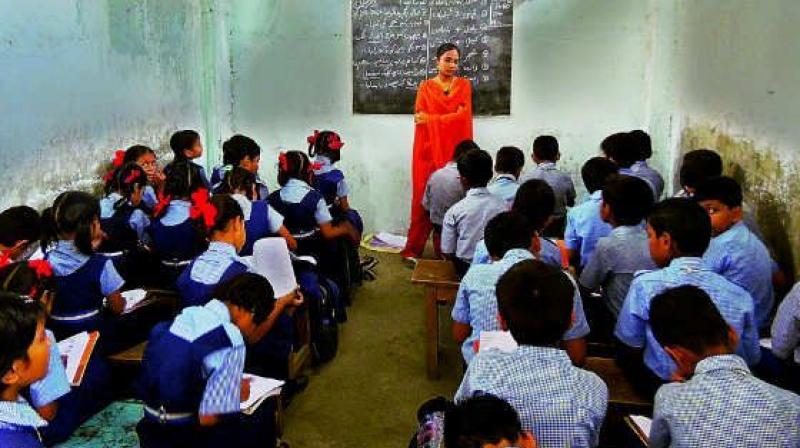Kerala teachers limping from reality to possibility

Four-day training program for teachers to push forward the state's ambitious “Protecting General Education of Kerala” mission couldn’t make the desired impact.
Education minister's sublime dream to raise its standards to the international level by digitising teachers' intellect deserves admiration, but the road ahead is so vague.
Here is a verbatim of the conversation among my teacher colleagues who participated in the training.
"Four days ended up in increasing the speed of my five fingers. Now I can type four words in a minute on an average," said one in her mid-forties.
“My son in high school can type at least 25 words in a minute. It’s a wonder to watch him forwarding messages on WhatsApp. In the classroom when we grope on the keyboard, they will chuckle," said another colleague.
“Who is going to take all these things into the classrooms? We haven’t any smart classes in our school. It's a waste of time. I don’t think it'll materialise within a decade.”
"After all the training we got has nothing to do with the improvement of students' problem-solving skills. And in the examination, it is the only skill that is being tested….who cares beyond exams? Where is the time for it?"
“Without doing homework, I don’t think I can improve myself in technology-based teaching. We have to engage in learning on a daily basis to make our brain muscles flexible. But with my three school going children to take care of, how can I find time? Never.”
Kerala teachers know how to stretch this reality to realise the ultimate aim-- raising up to international standards.
Though nobody in particular claim to have much clarity on 'standards', each teacher is trying her best to incorporate technology into learning. Still, in their mind, they are convinced they will not be able to walk the distance between “reality” and “possibility” in the near future.
Reasons are many.
Connection: If there is a perceptible chasm between educational objectives and the objectives of teacher training the likelihood of promoting technology in teaching will remain a distant dream.
Teachers and students will fail to envisage any connection between examination output and technology-based teaching.
For example, in maths training program, teachers were given hands on training in matrix operations using the software called GeoGebra.
But this hasn’t anything to do with how students are going to grasp the concept of matrix operations or any connection with the way they are going to do matrix multiplication or addition sitting in exam halls. Such disorganised training without planning the objectives germinate disgust. Teachers view this as a waste of time, energy, money and effort and productivity is the real casualty.
Infrastructure: For a teacher to establish a stable but dynamic interface of technology in the classroom setting is a matter of experimenting. What she takes away from training has to experiment on a daily basis. Teachers without smart class facility should not be given training in digitising. Because, acquiring knowledge and skill in wielding technological devices and applying the same in a teaching context, is a matter of learning by doing.
Time tested, research-based model for learning and development declares that a professional learns 70% from job-related experience, 20% from interactions and 10% from formal training.
This model is very much relevant here. Teachers’ training program can give 10% impetus to teacher development. The other 90% is to be gathered from the actual teaching situations. Lack of infrastructure hampers this possibility.
Head of the institution: No institution can expand beyond the vision of its leader. If the digital interface is not his priority, marrying technology and education will remain a distant dream. They digitalize classroom just to comply with the official orders.
Incentive: Grades or marks are incentives for students. For teachers who acquire proficiency in digitalized teaching get no such recognition. It will act as a demotivating factor.
Inertia: Concerted, determined effort is needed to break the inertia and bring back a human mind into learning mode. Calling back the student in each teacher is not an easy task.
Time: Space for preparing students adequately for exams is little. The prospect of generating a passion for learning by the sheer excitement alone is almost impossible. A teacher is not spending mandatory hours of time inside the classroom. Government drags them out and assigns other duties.
Balance: The work-life balance is an essential ingredient for success in any occupation.
Rectifications: In the present scenario, the possibility of technologizing classroom learning is a distant dream. The reformative steps overlook many factors cardinal to its success. The entire plan neglects issues operating at the micro level.
No significant event will meet success without visualising from the stance of all the stakeholders involved in it. Each mandatory step ordered by the government as a part of executing the project should be weighed against flaws in the existing system and possibilities for rectifying them.
To estimate the likelihood of potential impact of all reforms (on teachers, students, parents, institutions, society, leaders of institutions, infrastructure and all), research based scientific outcomes (pilot studies) must be produced before the implementation of the actual project.
At present, trailblazers of Kerala education system are making a pathetic attempt to build upon a shaky foundation. Their dream to build mansions on the foundation of one-storey buildings is a pipe dream.
What such architects of present education system lacking is the first-hand experience of things happening inside educational institutions of Kerala. Let these project designers come and stay in various schools for some days and feel the very pulse of present school climate and culture.
Then let them sit down to chart out the great dream project. Then the journey to excellence will be more smooth and worth following.
(Jeny Rapheal is a higher secondary school teacher working in Kerala. She has 16 years experience in the field of teaching. She has published more than 15 research papers in various national, international journals. At present she is researching adolescent psychology).

